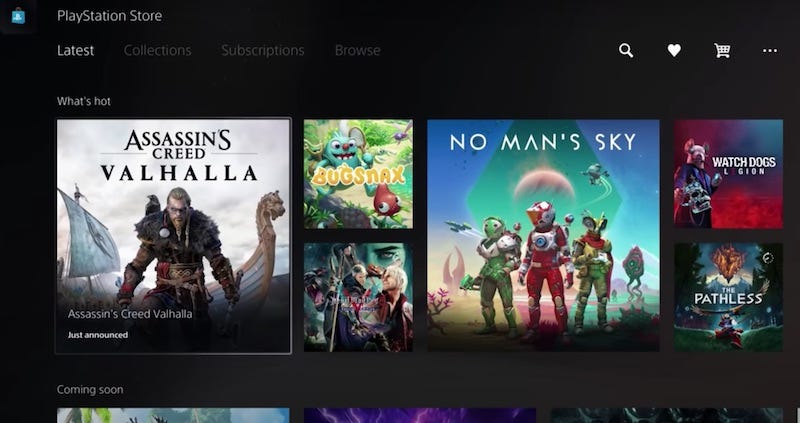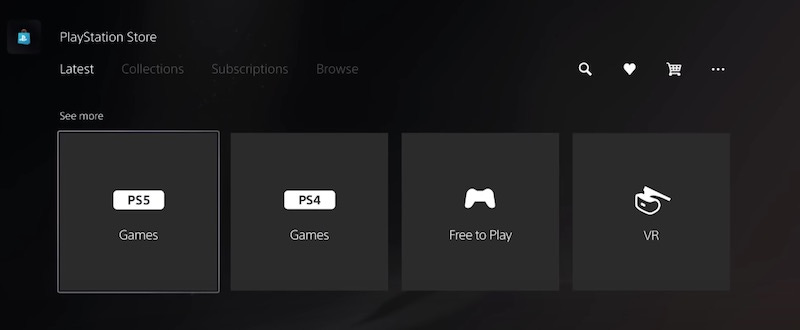Discovery takeaways from the new PlayStation 5 store?
And lots lots more, besides.
[The GameDiscoverCo game discovery newsletter is written by ‘how people find your game’ expert & GameDiscoverCo founder Simon Carless, and is a regular look at how people discover and buy video games in the 2020s.]
Welcome to the final GameDiscoverCo newsletter of the week, in which we discover actual snowdrifts of news have built up. This is thanks to next-gen console launches, the continued pushes towards cloud gaming, and sundry other announcements of note.
So let’s don our pith hat and push forward into the jungles of discoveryland…
Sony’s new PS5 digital store - what’s it like?
Now that the PlayStation 5 is out in the wild, we all get a chance to check out the brand new PS5 Store for discoverability, navigability, and various other factors. We already took a quick look at the new PlayStation web store in a recent newsletter, and there’s clearly code and navigation choices shared between the two.
(Side note: when it comes to next-gen consoles, the Xbox Series X/S’ store is using a lot of the same code as the Xbox One’s new store, which I examined in depth at the end of September. So no need to rehash that one.)
Anyhow, PlayStation Universe did a lightning-fast narration-free video zoom around the PS5 store. So I’ve embedded it for anyone who didn’t get a chance to check it out yet:
Looking at some of the notable features briefly, here are some our chief takeaways:
Human-picked featuring still reigns supreme. The top ‘Must See’ navigation bar has a series of small editorially chosen icons of both individual games (Demon’s Souls, Godfall) and categories like ‘New Games’ or ‘Discover.. Monthly Picks’. Particularly good to see ‘Discover’, which picks interesting games regardless of budget level.
Underneath that there’s a ‘What’s Hot?’ section (filled with large-budget games and first party titles), and a ‘Coming Soon’ section that’s surprisingly prominent compared to other stores (headlined by Horizon Forbidden West and Ratchet & Clank Rift Apart, both first-party PS5 titles.)
There’s also another layer of tabs at the top of the main screen for elements like ‘Subscriptions’ (PS+, PS Now, etc) and ‘Collections’ - themed set of things like Monthly Picks, PlayStation Indies, Essentials, a Superheroes collection and more. Within ‘Collections’, I saw one personalized ‘Because you Played’ element. But in general, the algorithmic recommendation elements are played down compared to Steam.
The ‘Wishlist’ button is back in a major way, for both released games you might be interested in buying (‘Buy’ or ‘Wishlist’) and for unreleased games (‘Wishlist’ or ‘Follow’). Previously, the wishlist option was only on the Web version of the store. (It was just taken away, and wasn’t sync-ed with the console.) I believe wishlisting is more like bookmarking on consoles nowadays?
When you scroll down far enough, you can do a basic browse by PS5 or PS4 games. (And there’s a TINY amount of PS5 games available right now. If you can release in the next few weeks on PS5, you could be golden!)
You can sort all PS5 and PS4 games by various parameters, including ‘best-selling’, which should provide some good data for the future.
Anyhow, our conclusion is - the new store looks high quality and is easily browsable. It’s still the most heavily platform-controlled of all of the console stores, which I am ambivalent on, because I think browsing best-selling games is a great discovery mechanism, and could be prioritized higher. (Both Microsoft and Nintendo do so.)
One small note - though they’ve now fixed this in the PlayStation web store, the PS5 on-console store still doesn’t list game names underneath the square icons when you’re browsing. (So if your PS4 game’s icon doesn’t have the game name readable on it - you might want to update.) But actually, the main issues we’re seeing at launch are not around store navigation, per se.
They’re based around some of the publisher-specific ‘do I get an upgrade, and which version of the game am I getting?’ PS4/PS5 game purchase issues - things like this:
Popagenda’s A/B concept test pitch!
The latest issue of Lizzie Killian’s ‘a bit like this newsletter, but game PR-specific’ missive VGPR comes bundled with a super-good interview with Geneviève St-Onge and Nicolas Verge of Swiss Army Knife publishing/promotion helpers popagenda (Bugsnax, lots more).
We particularly wanted to highlight it, because Nicolas (right) has a great comment around what indie studios - especially first timers - struggle with the most:
“We… get a lot of the classic ‘why does no one care about my game (ahead of launch)?’ or ‘why didn't it sell (post-launch)?’ questions. This is honestly something that is really hard to answer, and there is often not one simple answer to it. There’s a reason we see more indie devs basically A/B testing their game concept and/or art direction with GIFs on Twitter to see what catches on. It’s extremely heartbreaking when a game doesn’t find its audience, but it happens. A lot.”
This idea of exposing ideas to players super early and being transparent - in order to see what catches on - is still very underutilized. For example, Philomena Schwab of Stray Fawn Studio (Nimbatus, Niche) has been talking & exploring ideas re: their studio’s new game The Wandering Village, even before it had a name or a Kickstarter:
Of course, you can argue that your game isn’t the type that can be encapsulated so neatly, so that’s impossible. (At which point I might respond - slightly tongue in cheek - that this could be an issue, because then your game doesn’t have enough of a hook.)
The game discovery news round-up..
Well, it’s nearly almost the weekend, and we hope you all have something exciting planned for it. Playing the new video game consoles until the early hours of the morning, perhaps? In any case, here’s some links to serenade you to gameplay-induced slumber:
So yep, the Steam Game Festival (for pre-release game demos) is back in February 2021. While we’re less sure ‘put a demo/Prologue out there long term’ always moves the needle for games, short sharp focused demos in Festivals can be helpful to your cause. This is especially true if they get picked up by streamers, or primo featured by Valve. Just remember you can only do Festivals once nowadays!
In confusing but good news for Apple Mac as a video game format, you can now run iOS apps on the new Apple Silicon Macs. Among Us was an example, and devs from games like Baldur’s Gate 3 were also featured talking about this at the Apple press conference the other day. Nice to have OS unification, but not sure yet if Mac gaming as a format will see a massive boost - given that Mac desktop/laptop market share is relatively modest.
Steam tagging is an ‘eat your vegetables’ type problem. It’s a bit of a chore/hassle, but it’s worth doing to get incremental gains from the Steam algorithm. Chris Zukowski has a handy ‘101’ overview for his latest newsletter/blog. As he says, number 1 issue is: don’t put - or don’t let your users put - super common/generic tags high up on your tag list. Pick meaty subgenres.
Make of this what you will, but Warframe is the only non-Chinese game to have been government approved in China in the last 3 months (thx for tip, Chundi at Ampere Analysis.) Apparently: “The game is currently available in China, but has not been updated for more than a year The approval is supposed to be for the change of operator from Changyou to iDreamSky.”
Here’s a slightly publisher-poking Twitter thread from the folks at investor fund Kowloon Nights (Godfall, Spiritfarer - line-up pictured above.) It sets out their ethos and makes a clear/fair point: “For long-term stability and sustainability, we believe developers need the opportunity to establish and build their own brands and communities.” Funding self-published games can work great with devs who truly have the time & experience to nail the community and marketing. But you don’t always get the scale/group bargaining power that a publisher has with platforms.
NPD’s suggesting that the U.S. video game industry hit $11.2 billion in spend from July to September 2020, up 24% year on year. “The most significant gains were in mobile and subscription spending, full-game downloads for consoles and portables, and video game accessories. Hardware and accessories experienced double-digit percentage gains, increasing 16% and 35%, respectively.”
Of relevance to anyone who releases video games with soundtracks: Twitch is still struggling with DMCA music takedown-related issues. There’s some (isolated) hilarious false positives going on for games - and actually, here’s a great new explainer from The Verge.
Microlinks: ICO Partners finds the PS5 ahead of Xbox Series X in online coverage share leading up to launch; why PlayStation 5 is vital to Sony’s corporate reinvention as a whole; the ‘learn game dev from YouTubers’ trend continues with Thomas Brush (Neversong) launching the ‘Full Time Game Dev’ course.
Finally for this week, we were amused - slash slightly horrified - to find out that you can exchange reduced royalties on Spotify for more plays on featured playlists. No, seriously - imagine the Internet reaction if somebody like Steam did this, hahaha… *actually dies*.
[This newsletter is handcrafted by GameDiscoverCo, a new agency based around one simple issue: how do players find, buy and enjoy your premium PC or console game? We’ll be launching a ‘Plus’ paid newsletter tier with lots of extra info/data - watch out for it soon.]






